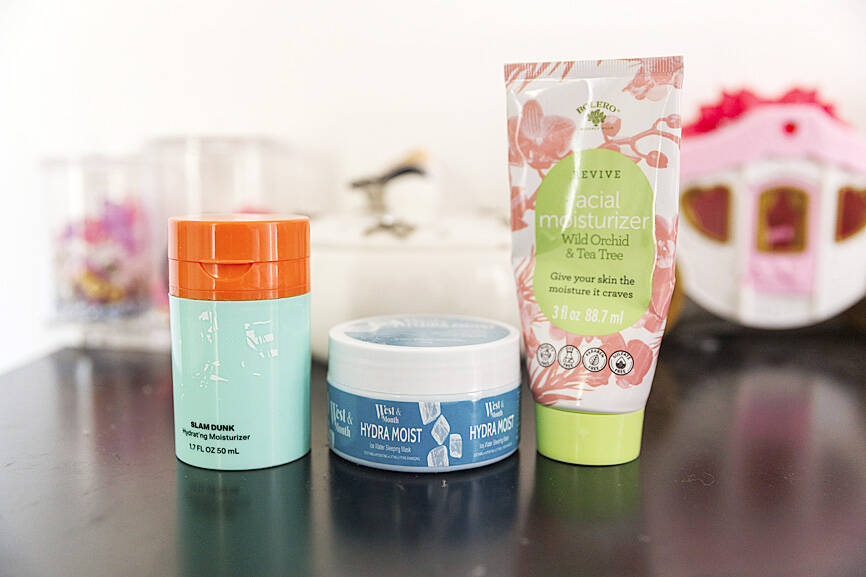When she was in fifth grade, Scarlett Goddard Strahan started to worry about getting wrinkles.
By the time she turned 10, she and her friends were spending hours on ByteDance Ltd’s TikTok and Google’s YouTube watching influencers tout products for achieving today’s beauty aesthetic: a dewy, “glowy,” flawless complexion. Goddard Strahan developed an elaborate skin care routine with facial cleansers, mists, hydrating masks and moisturizers.
One night, her skin began to burn intensely and erupted in blisters. Heavy use of adult-strength products had wreaked havoc on her skin. Months later, patches of tiny bumps remain on her face, and her cheeks turn red in the sun.

Photo: AP
“If I had known my life would be so affected by this, I never would have put these things on my face,” said Goddard Strahan, who recently turned 11.
Her experience has become common, experts said, as preteen girls around the country throng beauty stores to buy high-end skin care products.
Girls as young as eight are turning up at dermatologists’ offices with rashes, chemical burns and other allergic reactions to products not intended for children’s sensitive skin.

Photo: AP
“When kids use anti-aging skin care, they can actually cause premature aging, destroy the skin barrier and lead to permanent scarring,” said Brooke Jeffy, a Scottsdale, Arizona, dermatologist.
More than the physical harm, parents and child psychologists have voiced concerns about the trend’s effects on girls’ mental health. Extensive data suggest a fixation on appearance can affect self-esteem and body image and fuel anxiety, depression and eating disorders.
The skin care obsession offers a window into the role social media play in the lives of today’s youth and how it shapes the ideals and insecurities of girls in particular. Girls are experiencing record high levels of sadness and hopelessness.
Whether social media exposure causes or simply correlates with mental health problems is up for debate, but to older teens and young adults, it is clear: Extended time on social media has been bad for them, period.
Young girls’ fascination with makeup and cosmetics is not new. Neither are kids who hold themselves to idealized beauty standards.
What is different is the magnitude, said Kris Perry, executive director of Children and Screens, a nonprofit that studies how digital media affects child development.
“Girls are being bombarded with idealized images of beauty that establish a beauty standard that could be very hard — if not impossible — to attain,” Perry said.
The obsession with skin care is about more than the pursuit of perfect skin, 14-year-old Mia Hall said.
It is about belonging to a community that has the lifestyle and look you want, said Hall, a New Yorker from the Bronx.
Skin care was not on her radar until she started eighth grade last year. At school and on social media, girls bonded over their skin care routines.
“I felt like it was the only way I could fit in,” she said.
Hall started following beauty influencers on TikTok. Some influencers are paid by brands to promote their products, but they do not always mention that.
She started saving her US$20 weekly allowance for trips to Sephora. Her daily routine included a face wash, facial mist, hydrating serum, pore-tightening toner, moisturizer and sunscreen.
The level of detail and information girls are getting from beauty tutorials sends a troubling message as they are going through puberty and seeking their identities, said Charlotte Markey, a body image expert and Rutgers University psychology professor.
“The message to young girls is that ‘You are a never-ending project to get started on now,’” Markey said.
The beauty industry has been cashing in. Last year, consumers younger than 14 drove 49 percent of drug store skin sales, according to a NielsonIQ report that found households with teens and tweens were outspending the average US household on skin care.
In the first half of this year, one-third of “prestige” beauty sales, at stores such as Sephora, were driven by households with tweens and teens, market research firm Circana said.
The industry has acknowledged that certain products are not suitable for children, but has done little to stop kids from buying them.
The Web site of cosmetics brand Drunk Elephant states that children 12 and younger should not use their anti-aging serums, lotions and scrubs. That guidance is on the site’s FAQ page; there are no such warnings on the products themselves.
Ingredients such as retinol and chemical exfoliants such as hydroxy acids are inherently harsh. For aging skin, they are used to stimulate collagen and cell production.
Young skin can react with redness, peeling and burning that can lead to infections, acne and hypersensitivity if used incorrectly, dermatologists said.
Hall’s mother, Sandra Gordon, noticed dark patches on her face in spring and became alarmed. She threw all her daughter’s products into the trash.
Hall was not happy, but as she starts high school, she said she feels her mother was right.
She is using just a face wash and moisturizer and said that her complexion has improved.
In Sacramento, California, Goddard Strahan missed signs the products were hurting her skin: She developed a rash and felt a stinging sensation.
She said she figured she was not using enough of the products, so she layered on more.
That is when her cheeks erupted in blistering pain.
When her mother, Anna Goddard, read the ingredients in each product, she was shocked to find retinol in products that appeared to be marketed to children — including one with a cat’s face on the packaging.
Now, what worries her mother most is the psychological consequences. Kids’ comments at school have caused lingering anxiety and self-consciousness.
Goddard said she hopes to see more protections.
“I didn’t know there were harmful ingredients being put in skin care that is marketed to kids,” she said. “There has to be some type of warning.”

Nvidia Corp chief executive officer Jensen Huang (黃仁勳) on Monday introduced the company’s latest supercomputer platform, featuring six new chips made by Taiwan Semiconductor Manufacturing Co (TSMC, 台積電), saying that it is now “in full production.” “If Vera Rubin is going to be in time for this year, it must be in production by now, and so, today I can tell you that Vera Rubin is in full production,” Huang said during his keynote speech at CES in Las Vegas. The rollout of six concurrent chips for Vera Rubin — the company’s next-generation artificial intelligence (AI) computing platform — marks a strategic

REVENUE PERFORMANCE: Cloud and network products, and electronic components saw strong increases, while smart consumer electronics and computing products fell Hon Hai Precision Industry Co (鴻海精密) yesterday posted 26.51 percent quarterly growth in revenue for last quarter to NT$2.6 trillion (US$82.44 billion), the strongest on record for the period and above expectations, but the company forecast a slight revenue dip this quarter due to seasonal factors. On an annual basis, revenue last quarter grew 22.07 percent, the company said. Analysts on average estimated about NT$2.4 trillion increase. Hon Hai, which assembles servers for Nvidia Corp and iPhones for Apple Inc, is expanding its capacity in the US, adding artificial intelligence (AI) server production in Wisconsin and Texas, where it operates established campuses. This

US President Donald Trump on Friday blocked US photonics firm HieFo Corp’s US$3 million acquisition of assets in New Jersey-based aerospace and defense specialist Emcore Corp, citing national security and China-related concerns. In an order released by the White House, Trump said HieFo was “controlled by a citizen of the People’s Republic of China” and that its 2024 acquisition of Emcore’s businesses led the US president to believe that it might “take action that threatens to impair the national security of the United States.” The order did not name the person or detail Trump’s concerns. “The Transaction is hereby prohibited,”

Garment maker Makalot Industrial Co (聚陽) yesterday reported lower-than-expected fourth-quarter revenue of NT$7.93 billion (US$251.44 million), down 9.48 percent from NT$8.76 billion a year earlier. On a quarterly basis, revenue fell 10.83 percent from NT$8.89 billion, company data showed. The figure was also lower than market expectations of NT$8.05 billion, according to data compiled by Yuanta Securities Investment and Consulting Co (元大投顧), which had projected NT$8.22 billion. Makalot’s revenue this quarter would likely increase by a mid-teens percentage as the industry is entering its high season, Yuanta said. Overall, Makalot’s revenue last year totaled NT$34.43 billion, down 3.08 percent from its record NT$35.52